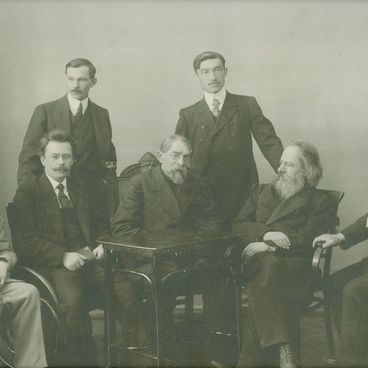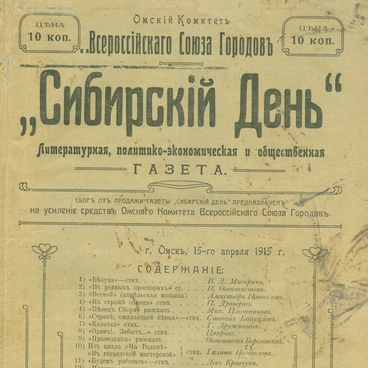The exhibition features a postcard French author Romain /ro’men/ Rolland /rol’lan/ sent to Georgy Vyatkin.
The typography postcard has a portrait of Romain Rolland on the front side and the author’s original text in French addressed to Georgy Vyatkin on the back. The two maintained correspondence for a long time.
Vyatkin named one of his books “Saddened Joy”. He used the words of Rolland, winner of the Nobel Prize for Literature during World War One, as an epigraph, “Blessed be joy, but blessed also be sorrow! One is the sister to the other and both are saints! They make the world and expand the souls of the great. They are strength, they are life, they are God! He who loves not both of them, loves neither the one nor the other. And he who has relished them knows the value of life and the sweetness of leaving it”.
Georgy Vyatkin was a Russian and Soviet prose writer, poet, playwright, and publicist. Besides, he was one of the founders of contemporary Siberian literature. Born in Omsk. Graduated from a teachers training college in Tomsk. In 1902, entered Kazan Teachers Institute. But later was expelled as a politically unreliable person. Having returned to Tomsk, he worked in the “Sibirskaya Zhizn” (Siberian Life). Over the years, he lived in Tomsk, Omsk, and NovosibIrsk. Vyatkin had a versatile talent. He wrote poems, short stories, essays, critical literary articles, theatrical and bibliographical reviews. Many of his pieces appeared in Siberian and Moscow periodicals.
He was acquainted and carried on a correspondence with many famous authors: Ivan Bunin, Maxim Gorky and Alexander Blok and also was in correspondence with French writer Romain Rolland. All his life, he was engaged in various literary activities. His works were published in many Siberian and Moscow periodicals.
During World War One, Vyatkin worked in healthcare units at the front line for more than two years. He rejected the October Revolution and joined the Socialist Revolutionary Party. After coming back to Omsk in summer 1918, he got engaged in many literary activities. In 1920, Vyatkin was trialled by the Omsk Revolutionary Tribunal and disfranchised for three years. In 1926, he moved to Novosibirsk where he worked in local magazines Sibir, Tovarishch and Sibirskiye Ogni. In 1930, he got the job of a technical and supervising editor of Siberian Soviet Encyclopedia. In 1937, he was arrested by NKVD (the Ministry of Internal Affairs) with regard to the case of the fake Labor-Peasant Party. He was executed by a firing squad on January 8, 1938, but exonerated in 1956. In the writer’s lifetime, seven poetry books and eight prose books were published. His works reflected both the populist traditions of the 1880s' ‘timelessness’ and symbolist novelties.



